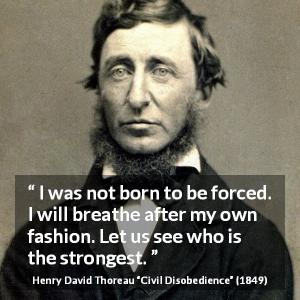


Étienne de La Boétie was one of the first to theorize and propose the strategy of non-cooperation, and thus a form of nonviolent disobedience, as a really effective weapon. Étienne de La Boétie's thought developed in his work Discours de la servitude volontaire ou le Contr'un (1552) was also taken up by many movements of civil disobedience, which drew from the concept of rebellion to voluntary servitude the foundation of its instrument of struggle. Ĭonrad Grebel and Anabaptists advocated civil disobedience to oppression. She is not at all afraid of the death he threatens her with (and eventually carries out), but she is afraid of how her conscience will smite her if she does not do this. She gives a stirring speech in which she tells him that she must obey her conscience rather than human law.


Although civil disobedience is rarely justifiable in court, King regarded civil disobedience to be a display and practice of reverence for law: "Any man who breaks a law that conscience tells him is unjust and willingly accepts the penalty by staying in jail to arouse the conscience of the community on the injustice of the law is at that moment expressing the very highest respect for the law." History Īn early depiction of civil disobedience is in Sophocles' play Antigone, in which Antigone, one of the daughters of former King of Thebes, Oedipus, defies Creon, the current King of Thebes, who is trying to stop her from giving her brother Polynices a proper burial. Martin Luther King Jr.'s and James Bevel's peaceful protests during the civil rights movement in the 1960s United States contained important aspects of civil disobedience. women's suffrage movement in the late 1800s, Saad Zaghloul in the 1910s culminating in Egyptian Revolution of 1919 against British Occupation, and Mahatma Gandhi in 1920s India in their protests for Indian independence against the British Empire. Henry David Thoreau's essay Resistance to Civil Government, published posthumously as Civil Disobedience, popularized the term in the US, although the concept itself has been practiced longer before. Hence, civil disobedience is sometimes equated with peaceful protests or nonviolent resistance. By some definitions, civil disobedience has to be nonviolent to be called "civil". Civil disobedience is the active, professed refusal of a citizen to obey certain laws, demands, orders or commands of a government (or any other authority).


 0 kommentar(er)
0 kommentar(er)
